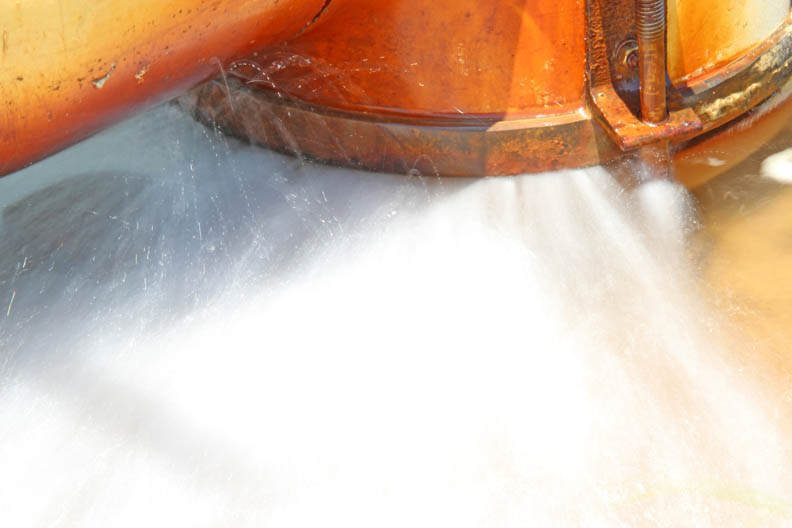
Texas takes water rustling war to Supreme Court
Texas and New Mexico have been squabbling over the water of the Rio Grande since 2008. Texas is charging New Mexico water officials with failure to control groundwater pumping in the Rio Grande River basin, preventing farmers and municipalities from receiving their allocated rights.Officials from the New Mexico Attorney General’s Office have responded by accusing Texas of what they term “water rustling.”

We have heard about the importance of water and the growing scarcity of the resource from dozens of sources in recent years. Former United Nations Secretary General Boutros Boutros Ghali is credited with being one of the first to warn of pending global water woes back in 1985 when he said “the next war in the Middle East will be fought over water, not politics,” and again in 2003 when he said “water will [soon] be more important than oil.”
A 2009 United Nations water report warned us that by 2025, 1.8 billion people will be living in countries or regions with absolute water scarcity, and two-thirds of the world population could be under stress conditions. The report elaborated that water withdrawals are predicted to increase by 50 percent by 2025 in developing countries, and 18 percent in developed countries and that water use has been growing at more than twice the rate of population increases over the last century.
In spite of the widespread concerns over water, others argue that too much emphasis is being placed on a potential crisis. They suggest there is considerable concern over water globally, but say we are not necessarily in the immediate danger that some politicians and journalists are suggesting. They claim countries have historically been quick to rattle their sabers over water in the past, but have nevertheless restrained sending soldiers into their neighbor’s backyard to make claim on the life-sustaining resource.
So far, they point out, there have been few, if any, real wars fought over water.
Regardless of your take on the issue of water availability and crisis, and regardless whether you believe in climate change, escalating populations, industrial and commercial abuse such as pollution and waste, or dwindling supplies because of too much demand are the reason or not, growing evidence seems to show that water is indeed a disappearing resource.
The severe drought that has plagued U.S. agriculture over the last couple of years, the growing tensions over water rights between the U.S. and Mexico over water rights in the Rio Grande River, the diminishing reserves of available water in the Colorado River, and the greater demand from large Western cities and industries are just some recent headlines that point to growing concerns that water is indeed a real crisis for all stakeholders who depend on it.
Texas tension
In the continuing conflict over water resources between two neighboring Southwest states, for example, officials from Texas filed a lawsuit with the U.S. Supreme Court last week in its dispute with New Mexico over water rights of the Rio Grande. The people and governments of three states and two nations have stake in water from the river, and the Texas Commission on Environmental Quality (TCEQ) says New Mexico is violating the 1938 Rio Grande Compact that governs how water is shared by Texas, New Mexico and Colorado. In a statement announcing the legal action, TCEQ Commissioner Carlos Rubenstein called the action unfortunate but necessary.
“It is unfortunate that we have had to resort to legal action, but negotiations with New Mexico have been unsuccessful, and Texas is not getting the water that it is allocated and legally entitled to,” Rubinstein said.
Texas and New Mexico have been squabbling over the water of the Rio Grande since 2008. According to complaints filed by Texas officials, they are charging New Mexico water officials with failure to control groundwater pumping in the Rio Grande River basin south of Elephant Butte Reservoir, which has reduced surface water flow in the river as it makes it way to the Texas-New Mexico border. The complaint claims such action prevents Texas farmers and municipalities who depend on the water, including the City of El Paso, from receiving their allocated rights to the valuable resource.
Officials from the New Mexico Attorney General’s Office have responded by accusing Texas of what they term “water rustling.”
Water concerns in both southern New Mexico and Far West Texas have been increasing in recent years as high demand for water resources escalates, driven by both urban growth and agricultural demands. Southern New Mexico is a noted agricultural center responsible for one of the nation’s largest concentrations of pecan production and also home to the state’s large chile production. The region also has high concentrations of cattle ranches.
Mexico controversy
Concerns over water rights have also been flamed in recent years after Mexico and the United States have both argued over international rights to water from the river. The long standing international water dispute was responsible for the forming of the International Boundary and Water Commission (IBWC) in 1948, a bi-national organization charged with developingbi-national solutions to issues that arise during the application of United States-Mexico treaties regarding boundary demarcation and national ownership of waters. In recent years, the two nations have seen heightened tensions over water ownership and methods of withdrawing, resupplying and storing water.
Last year Mexican water officials requested an early delivery of their legal allotment of water from Elephant Butte Reservoir, a development that Texas and New Mexico officials claimed caused U.S. water stakeholders to lose significant water rights in the process.
Water shortages in both states have resulted in hardships for agricultural interests and also for cities like Las Cruces and El Paso. Even farmers in distant South Texas, home to Texas’ diminishing but lucrative citrus industry, have felt the strain of less available water for irrigation.
Also adding to water woes across the Southwest is the ongoing drought across the region and its recharge zone as far north as Colorado’s Rocky Mountain range, a problem that has intensified current water shortages. The latest forecast projects lower than average water runoff from snow accumulation in New Mexico in 2013.
In addition, forecasters with the federal Natural Resources Conservation Service project flows on the Rio Grande at a measuring point between Santa Fe and Los Alamos to be just under half the average over the last 30 years this year, and forecasters are calling for runoff of only 22 percent of the average at Santa Rosa Lake in Eastern New Mexico. These runoffs are necessary, according to state officials, to replenish reservoir levels to provide adequate water resources not only for farmers but also for New Mexico cities over the dry spring and summer season.
Further evidence of the growing water crisis is a dispute from a coalition of New Mexico ranchers who filed a legal complaint against the State of New Mexico over a state-national water protection measure that provides special designation to hundreds of miles of New Mexico rivers and streams and provides protection to lakes and wetlands in federal wilderness areas within the state. The legal complaint, filed by the New Mexico Cattle Growers Association (NMCGA), charges the agreement did not allow sufficient public input before terms were worked out, agreed upon and signed into law back in 2010. Officials at the NMCGA say they are concerned that the agreement to designate water resources in the wilderness areas is too broad and could lead to lawsuits over grazing on public lands.
The fight for water rights in the Southwest is not an isolated incident. More and more news is filtering out about water disputes and legal battles over water rights in many states and extends across international borders into Mexico and across Central and South America as well. In fact, water is becoming a more contested resource in large areas across the world, reminding us that population growth and industrial and agricultural expansion will continue to drive the issue into further crisis in the years ahead. Undoubtedly, water will prove to be a prevailing issue in the news headlines of tomorrow and for years to come.
About the Author(s)
You May Also Like





